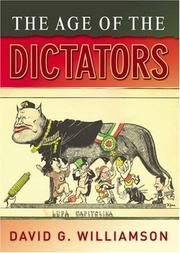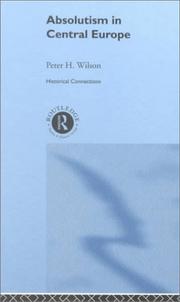| Listing 1 - 10 of 48 | << page >> |
Sort by
|

ISBN: 2130426166 9782130426165 Year: 1989 Volume: 2486 Publisher: Paris: PUF,
Abstract | Keywords | Export | Availability | Bookmark
 Loading...
Loading...Choose an application
- Reference Manager
- EndNote
- RefWorks (Direct export to RefWorks)
History of France --- 321.61 --- Absolutism --- Absolutism.

ISBN: 131787014X 131583619X 1317870131 1281830453 9786611830458 1408250802 9781317870135 9780582505803 0582505801 9781317870142 9781315836195 9781317870128 9781138168954 Year: 2007 Publisher: London ; New York ; Tokyo...[et al.] Pearson Longman
Abstract | Keywords | Export | Availability | Bookmark
 Loading...
Loading...Choose an application
- Reference Manager
- EndNote
- RefWorks (Direct export to RefWorks)
The Age of the Dictators presents a comprehensive survey of the origins and interrelationship of the European dictatorships. All the regimes are addressed, with ample coverage of the period 1939-45, and analysis of the Soviet government up to Stalin's death in 1953.Exploring their ideological and political roots, and the role of the First World War in their rise to power, David Williams identifies the dictatorships as products of their time. He examines the Soviet, Italian Fascist and Nazi dictatorships, as well as the authoritarian regimes in Spain, Portugal, Eastern Europe
Dictatorship --- Absolutism --- Autocracy --- Tyranny --- Authoritarianism --- Despotism --- Totalitarianism
Book
ISBN: 9783465041535 3465041534 Year: 2012 Volume: 272 Publisher: Frankfurt am Main: Klostermann,
Abstract | Keywords | Export | Availability | Bookmark
 Loading...
Loading...Choose an application
- Reference Manager
- EndNote
- RefWorks (Direct export to RefWorks)
Rule of law --- Law --- Law reform --- Ethical absolutism --- Codification --- Svarez, Carl Gottlieb, --- Absolutism. --- Land law. --- Prussian law. --- Law - Codification --- Svarez, Carl Gottlieb, - 1746-1798
Book
ISBN: 9781611475890 9781611475906 1611475902 9781299730861 1299730868 1611475899 9781611478303 Year: 2013 Publisher: Teaneck ; Madison Fairleigh Dickinson University
Abstract | Keywords | Export | Availability | Bookmark
 Loading...
Loading...Choose an application
- Reference Manager
- EndNote
- RefWorks (Direct export to RefWorks)
This book provides a transatlantic and interdisciplinary perspective of dictatorships in the Hispanic World, focusing on the common strategies used to represent and/or protest these regimes in narrative, film, poetry, essays, theater, and visual arts. By looking at the similarities and differences of dictatorships represented in the diverse landscapes of Latin America and Spain, we hope to provide a more panoramic view of the dictatorship that moves beyond historiographical accounts of oppression and engages actively in a more broad dialectics of resistance and a politics of memory
Spanish-American literature --- Thematology --- Dictatorship --- Absolutism --- Autocracy --- Tyranny --- Authoritarianism --- Despotism --- Totalitarianism
Book
Abstract | Keywords | Export | Availability | Bookmark
 Loading...
Loading...Choose an application
- Reference Manager
- EndNote
- RefWorks (Direct export to RefWorks)
Die kritische Diagnose des Buches lautet: Ein Großteil der nachmetaphysischen Ethik, die heute den Ton angibt, ist innerlich defekt. Sie leidet an einem Zuviel an Säkularisierung. Jede Moral, die den Anspruch auf Universalität zu Recht erhebt, hat einen metaphysischen Horizont: das absolut Gute. Das absolut Gute ist dasjenige, was wir um seiner selbst willen anstreben. Es ist gut in allen möglichen Welten, unabhängig davon, was hier und jetzt für gut befunden wird. Gegen die zunehmende Immanenzverdichtung wird argumentiert, dass die Ethik wesenhaft auf zwei Grundpfeilern ruht. Erstens: Die transzendente Freiheit des Ichs ist eine Voraussetzung der Moral. Daher scheitern die Naturalisten, wenn sie den biologischen Menschen zugleich als ethisches Subjekt denken. Zweitens: Der Mensch ist nicht begreifbar als der Schöpfer seiner eigenen Werte. Daher muss der ethische Subjektivismus falsch sein. Gezeigt wird, wie unter dem Vorzeichen der Moderne, die auf kulturellem Gebiet relativistisch verfährt, dennoch ein visionärer Objektivismus in der Moral überlebt. Werte sind Wertpotentiale, deren Wahrheitsgehalt die Vielfalt benötigt, um sich zu offenbaren. Inhalt: Einleitung Teil A: Die Richtung des Guten I. Das Gute und das Gesollte II. Von Werten zu Normen III. Die ethische Blindheit des Naturalismus IV. Die Transzendenz des Guten V. Die Nichtkontingenz der Werte VI. Wertsachverhalte VII. Selbstevidenz und aufgeklärte Intuition VIII. Das Kriterium des Nicht-Wollen-Könnens IX. Der Kontext des guten Lebens X. Der axiologische Horizont: das Beispiel Abtreibung XI. Was wir um seiner selbst willen anstreben XII. Werte als Eröffnungspotentiale XIII. Die axiologische Richtung XIV. Die axiologische Grundtransformation Teil B: Die Kategorien des Guten XV. Autonomes Leben XVI. Schönheit: Sinnenreiz und Verklärung XVIII. Das gute Ich Teil C: XIX. Nach der Endzeit: Der Weg ist das Ziel XX. Angenommen, Jesus würde wiederkommen.
Bien et mal --- Ethics --- Ethiek --- Ethique --- Evil [Problem of ] --- Goed en kwaad --- Good and evil --- Kwaad [Probleem van het ] --- Mal [Problème du ] --- Probleem van het kwaad --- Problem of evil --- Problème du mal --- Ethical absolutism --- Evil --- Wickedness --- Philosophy --- Polarity --- Religious thought --- Absolutism (Ethics) --- Moral absolutism --- Good and evil. --- Ethical absolutism.
Book
ISBN: 9789020466607 Year: 2011 Publisher: Amsterdam,
Abstract | Keywords | Export | Availability | Bookmark
 Loading...
Loading...Choose an application
- Reference Manager
- EndNote
- RefWorks (Direct export to RefWorks)
Biografieën --- Toerisme --- Dictatuur --- Dictatorship --- Tourism --- Absolutism --- Autocracy --- Tyranny --- Authoritarianism --- Despotism --- Totalitarianism --- Europe
Book
ISBN: 9781107610736 9780511846410 9781107010321 9781107341470 1107341477 051184641X 9781107345225 1107345227 9781107347724 1107347726 1107010322 1107357349 1107234654 1107343976 1107255392 1107610737 Year: 2013 Publisher: New York Cambridge University Press
Abstract | Keywords | Export | Availability | Bookmark
 Loading...
Loading...Choose an application
- Reference Manager
- EndNote
- RefWorks (Direct export to RefWorks)
This is the first comprehensive exploration of ancient and modern tyranny in the history of political thought. Waller R. Newell argues that modern tyranny and statecraft differ fundamentally from the classical understanding. Newell demonstrates a historical shift in emphasis from the classical thinkers' stress on the virtuous character of rulers and the need for civic education to the modern emphasis on impersonal institutions and cold-blooded political method. By diagnosing the varieties of tyranny from erotic voluptuaries like Nero, the steely determination of reforming conquerors like Alexander the Great and Julius Caesar and modernizing despots such as Napoleon and Ataturk to the collectivist revolutions of the Jacobins, Bolsheviks, Nazis and Khmer Rouge, Newell shows how tyranny is every bit as dangerous to free democratic societies today as it was in the past.
Despotism. --- Absolutism --- Autocracy --- Tyranny --- Authoritarianism --- Dictatorship --- Totalitarianism --- Arts and Humanities --- Philosophy

ISBN: 113474806X 0203278844 1280107952 0203441796 9780203278840 9780203441794 9780415233514 0415233518 9780415150439 0415150434 0203750039 9780203750032 9786610107957 6610107955 9781134748013 9781134748051 9781134748068 1134748051 Year: 2000 Publisher: London New York Routledge
Abstract | Keywords | Export | Availability | Bookmark
 Loading...
Loading...Choose an application
- Reference Manager
- EndNote
- RefWorks (Direct export to RefWorks)
Absolutism in Central Europe is about the form of European monarchy known as absolutism, how it was defined by contemporaries, how it emerged and developed, and how it has been interpreted by historians and political and social scientists.
Despotism --- Absolutism --- Autocracy --- Tyranny --- Authoritarianism --- Dictatorship --- Totalitarianism --- Europe, Central --- Politics and government. --- Europe [Central ] --- Politics and government
Book
ISBN: 2130511163 9782130511168 Year: 2000 Volume: *69 Publisher: Paris: PUF,
Abstract | Keywords | Export | Availability | Bookmark
 Loading...
Loading...Choose an application
- Reference Manager
- EndNote
- RefWorks (Direct export to RefWorks)
Political science --- Despotism --- Science politique --- Despotisme --- Philosophy --- History --- Philosophie --- Histoire --- Despotism. --- Philosophy. --- Political philosophy --- Absolutism --- Autocracy --- Tyranny --- Authoritarianism --- Dictatorship --- Totalitarianism --- Political science - Philosophy.
Book
ISBN: 9789004187757 9004187758 9786612787133 9004188835 1282787136 9789004188839 Year: 2010 Volume: 11 Publisher: Leiden [etc.] Brill
Abstract | Keywords | Export | Availability | Bookmark
 Loading...
Loading...Choose an application
- Reference Manager
- EndNote
- RefWorks (Direct export to RefWorks)
Graeco-Roman literary works, historiography, and even the reporting of rumours were couched as if they came in response to an insatiable desire by ordinary citizens to know everything about the lives of their leaders, and to hold them to account, at some level, for their abuse of constitutional powers for personal ends. Ancient writers were equally fascinated with how these same individuals used deceit as a powerful tool to disguise private and public reality. The chapters in this collection examine the themes of despotism and deceit from both historical and literary perspectives, over a range of historical periods including classical Athens, the Hellenistic kingdoms, late republican and early imperial Rome, late antiquity, and Byzantium.
Deception --- Despotism --- Political aspects --- History to 1500 --- History --- History. --- History to 1500. --- Chicanery --- Deceit --- Subterfuge --- Truthfulness and falsehood --- Intrigue --- Absolutism --- Autocracy --- Tyranny --- Authoritarianism --- Dictatorship --- Totalitarianism
| Listing 1 - 10 of 48 | << page >> |
Sort by
|

 Search
Search Feedback
Feedback About UniCat
About UniCat  Help
Help News
News